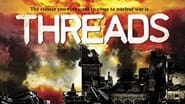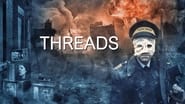thesar-2
I remember hearing about the cold war when I was young. Hell, I lived through the last part of it. But, I was never told about this. Too bad. This would've educated ANYONE on how dumb countries are for having nukes.For a nearly 3½ decades-old TV movie, I'm thoroughly amazed on how realistically this was shot, told and presented. I'm sure they had budget concerns for being on the tele, but for 95% of the film, you wouldn't see any real issues. And, I personally only had one major issue with the whole idea of this mockumentary's take on nuclear war and its fallout.Let's just not get ahead of ourselves and start from the beginning. And a beginning I almost turned off several times, admittedly. I'm glad I didn't.The film's first half was everyday life in a British town with the threat of war from the big baddies of the time: US v USSR via Iran. (Huh, sounds familiar, 34 years later...) People did take notice - some riots happened, rallies definitely and some panic at the grocery stores, but for the most part, realistically, life went on for these Brits. As stated, BAM! about half-way through, THEE bomb goes off nearby. Several, in fact. Prior, we followed a few families and families-to-be and we were also introduced to "the men and woman who could, ah-hem, haphazardly, put society back together after this kind of event." After the nuclear strikes, we see some of their struggles, but also a somewhat guide of survival. Bad news: it WON'T be easy or pretty.Again, this movie holds up today and for this first time viewer who didn't even know this movie existed more than a couple of hours ago, I was wildly blown away (sorry) with how well everything came out onscreen: from the makeup, to the destruction, to the narration of what was happening overall.My only gripe, I previously mentioned, was that this seemed to give the impression that every square inch of the Earth was nuked and no help would ever come. I find that hard to believe. There's always someone willing to help and serve mankind whether it be from the heart or from someone seeking power and riches. One way or another, someone's coming in to help. Unless, again, the entire surface of the world was destroyed...and I just don't buy that.But, say you do buy that, well then, this movie is a great lesson on the monsters who would even consider using nukes to solve any kind of conflict. This ABSOLUTELY should be shown to those in power and even though I'm ignorant to the process, I would love to see at least 40-50 checks go through before this option is even considered. Personally, if I had my way, all nukes would be flown up into space, into a huge net and tossed into the sun like in Superman IV: The Quest for Peace. But, like that movie, most would think that's a terrible idea.This is a powerful movie and despite the slow start, or first half, it's absolutely worth seeing. It's just too stinking bad this annihilation of Planet Earth is still an option for some countries. Including my own.***Final thoughts: I understand this is TV movie, but how has this NOT been more widely known? Like I said above, before tonight, I never heard of this. I remember glowing (again, sorry) after seeing Hidden Figures and stating: that movie needs to be seen by all, ESPECIALLY young girls and women. This "Threads" film also needs to be seen by all, ESPECIALLY for those who actually, and horrifyingly, love the bomb. And never stop worrying.
Chris_Lacon
It's a true testament to a films impact and power, when its narrative and its images stay with you for years or even decades after its release. It's even more impressive when a television movie, often resigned as cinema's lesser equivalent, manages that same feat despite lower budgets and lesser known stars. "Threads" shot on a shoestring budget of between £250 to 350,000 and first broadcast on 24th September 1984, is one of the few television films that transcends its medium and in many ways, surpasses even cinematic features in its depiction of apocalyptic events. It also say's a considerable amount when, despite relatively few repeats, it's visceral, grotesque images still stay with its viewers more than three decades after its original broadcast."Threads" similarly to its American predecessor "The Day After", released a year before, depicts the events leading up to, during and after a Soviet-American nuclear war and the resulting social, medical and psychological breakdown of society. Unlike "The Day After", which shows up to a few weeks after the nuclear exchange, "Threads" shows what would happen 10 years following the attacks, allowing for a greater perspective on the aftermath. That, in my opinion, is why "Threads" packs a far harder punch than "The Day After" which, whist harrowing in its own way, has a more definitive end: with "Threads" the horror never ends.Key to the film's power is the way the director, Mick Jackson, approaches the material. More kitchen sink drama then disaster movie, "Threads" was written by Barry Hines, author and screenwriter of the excellent "Kes". Jackson gives "Threads" a similar approach to the latter, portraying realistic, ordinary characters caught up in events far beyond their control. There are no scenes depicting Soviet and American generals bickering and blustering, instead, the political and military drama takes a backseat to the human drama. What we have instead, is an everyday scenario regarding an unplanned pregnancy, between two people from different social classes in Sheffield. A subplot details the bureaucratic and ultimately futile plans of a group of civil servants to keep the country running, should war break out. We are kept informed of escalating events between Russia and the United States via scant news reports, scattered radio broadcasts and a clipped, almost matter of fact narration from Paul Vaughan. There are no massive action set pieces showing cities being vaporised: instead inter-titles showing figures and statistics, clinically describe the worlds decent into nuclear holocaust.Cast wise, "Threads" is, for the large part, devoid of household names, unlike "The Day After" which counts Jason Robards and John Lithgow among its cast. Here, the cast is comprised of mostly unknown actors, adding to the strong sense of realism. Few of the actors are household names, so their performances here are not tainted by their over familiar faces or associations with any other roles. Instead, the actor's anonymity helps the audience immerse themselves in the story and relate to the characters more. Following the attack scenes, several characters are never seen again, effectively putting us in the remaining characters shoes: they don't know what's happened to their loved ones and neither do we.Ultimately, what makes "Threads" stand out among its contemporaries, are its true commitment to both realism and showing the audience the true, terrifying aftermath of nuclear war. The film shows us, in almost unbearable detail, the graphic and rapid deterioration of humanity once the bombs drop and the fallout descends. . Ironically despite the films subject matter there are comparatively few gruesome scenes, even the stomach churning hospital scene is shot and edited in such a chaotic, fleeting way that it leaves more of a psychological impact then a visceral one and shots of burned corpses are brief. The film's horror instead lies, not in graphic shots of dead and disfigured bodies, but in showing the complete and total breakdown of social order and how quickly the "threads" of society become severed. The majority of the films disturbing imagery is depicted in the third act of the story, depicting ten years after the attacks. What used to be Sheffield is now a burned out wasteland, inhabited by a dwindling population of sick, starving and blind survivors trying vainly to eke out an existence from the poisoned soil. The few children born since the war are illiterate, feral and barely capable of speaking English due to the nonexistent education system. The most horrific image that the film conjures up is its final one: due to years of radiation exposure, the next generation are stillborn and deformed and any lingering hope that the viewer had for a happy ending is brought crashing down.For all the praise I've heaped on the film thus far, "Threads" does have a few, comparatively minor flaws. Some of the characters feel somewhat underdeveloped, although this could be overlooked, as due to the films style and commitment to realism giving the characters Hollywood style story arcs would have been jarring with the films tone. Secondly, due to the time and political climate when the film was made, it is perhaps unsurprising that the film is by now very dated, however again this can be overlooked as the films raw power overrides the films dated look. Indeed the films gritty, grainy stock really helps convey the squalor of the post war world.Overall, "Threads" is a true television masterpiece that far surpasses the "The Day After" and the rest of its contemporaries. Powerful, hard hitting and thought provoking, "Threads" is guaranteed to linger in the mind long after it's over. Overcoming its minuscule budget and dedicated to showing the true face of nuclear war in all its grotesque, nightmarish realism, Mick Jackson delivers a truly terrifying glimpse into a world that could have been, could still be and must never be.



